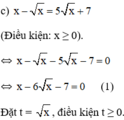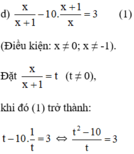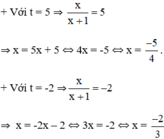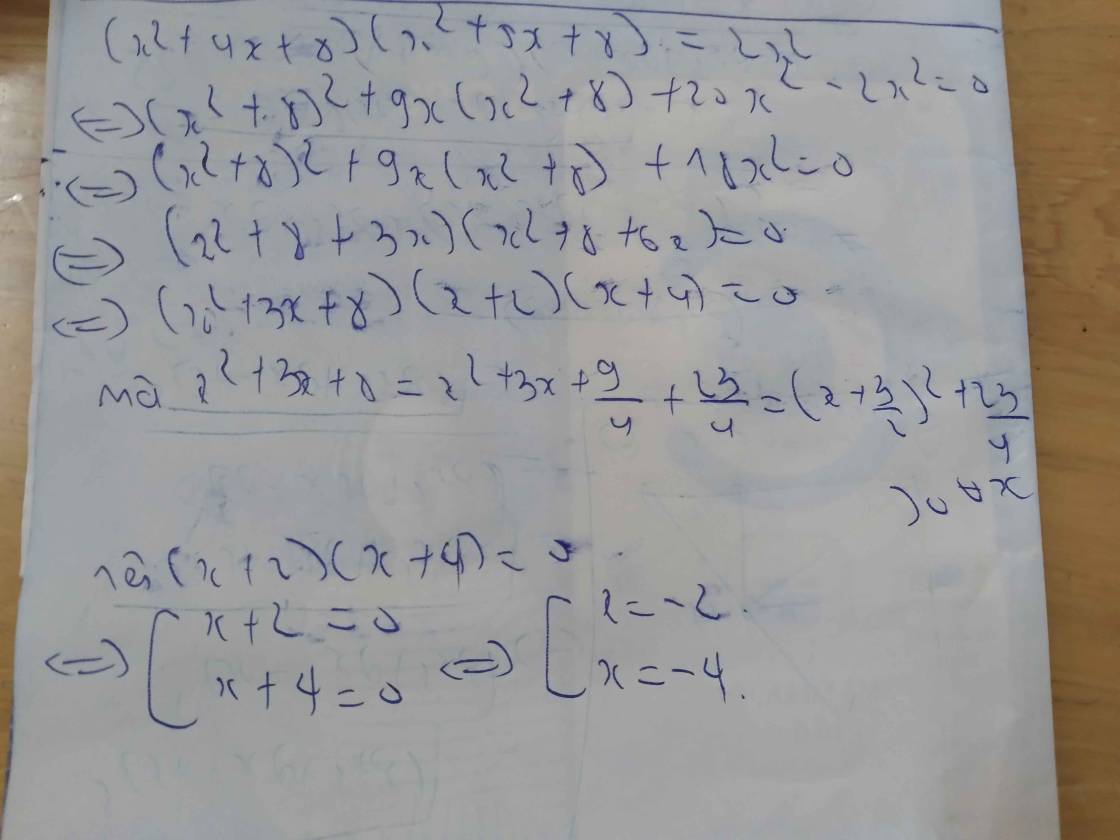Giải phương trình: (8−√5x−x2)⋅(√x−√5−x)=4x−10
Hãy nhập câu hỏi của bạn vào đây, nếu là tài khoản VIP, bạn sẽ được ưu tiên trả lời.


1) Ta có: \(x^2-4x+4=0\)
\(\Leftrightarrow\left(x-2\right)^2=0\)
\(\Leftrightarrow x-2=0\)
hay x=2
Vậy: S={2}

a)
3 · x 2 + x 2 - 2 x 2 + x - 1 = 0 ( 1 )
Đặt t = x 2 + x ,
Khi đó (1) trở thành : 3 t 2 – 2 t – 1 = 0 ( 2 )
Giải (2) : Có a = 3 ; b = -2 ; c = -1
⇒ a + b + c = 0
⇒ (2) có hai nghiệm t 1 = 1 ; t 2 = c / a = - 1 / 3 .
+ Với t = 1 ⇒ x 2 + x = 1 ⇔ x 2 + x – 1 = 0 ( * )
Có a = 1; b = 1; c = -1 ⇒ Δ = 1 2 – 4 . 1 . ( - 1 ) = 5 > 0
(*) có hai nghiệm


Có a = 3; b = 3; c = 1 ⇒ Δ = 3 2 – 4 . 3 . 1 = - 3 < 0
⇒ (**) vô nghiệm.
Vậy phương trình (1) có tập nghiệm 
b)
x 2 − 4 x + 2 2 + x 2 − 4 x − 4 = 0 ⇔ x 2 − 4 x + 2 2 + x 2 − 4 x + 2 − 6 = 0 ( 1 )
Đặt x 2 – 4 x + 2 = t ,
Khi đó (1) trở thành: t 2 + t – 6 = 0 ( 2 )
Giải (2): Có a = 1; b = 1; c = -6
⇒ Δ = 1 2 – 4 . 1 . ( - 6 ) = 25 > 0
⇒ (2) có hai nghiệm

+ Với t = 2 ⇒ x 2 – 4 x + 2 = 2
⇔ x 2 – 4 x = 0
⇔ x(x – 4) = 0
⇔ x = 0 hoặc x = 4.
+ Với t = -3 ⇒ x 2 – 4 x + 2 = - 3
⇔ x2 – 4x + 5 = 0 (*)
Có a = 1; b = -4; c = 5 ⇒ Δ ’ = ( - 2 ) 2 – 1 . 5 = - 1 < 0
⇒ (*) vô nghiệm.
Vậy phương trình ban đầu có tập nghiệm S = {0; 4}.

Khi đó (1) trở thành: t 2 – 6 t – 7 = 0 ( 2 )
Giải (2): Có a = 1; b = -6; c = -7
⇒ a – b + c = 0
⇒ (2) có nghiệm t 1 = - 1 ; t 2 = - c / a = 7 .
Đối chiếu điều kiện chỉ có nghiệm t = 7 thỏa mãn.
+ Với t = 7 ⇒ √x = 7 ⇔ x = 49 (thỏa mãn).
Vậy phương trình đã cho có nghiệm x = 49.

⇔ t 2 – 10 = 3 t ⇔ t 2 – 3 t – 10 = 0 ( 2 )
Giải (2): Có a = 1; b = -3; c = -10
⇒ Δ = ( - 3 ) 2 - 4 . 1 . ( - 10 ) = 49 > 0
⇒ (2) có hai nghiệm:


Cả hai nghiệm đều thỏa mãn điều kiện xác định.
Vậy phương trình đã cho có tập nghiệm 

ĐKXĐ: \(0\le x\le5\).
Đặt \(\left\{{}\begin{matrix}\sqrt{x}=a\\\sqrt{5-x}=b\end{matrix}\right.\left(a,b\ge0\right)\).
PT đã cho tương đương với: \(\left(8-ab\right)\left(a-b\right)=2\left(a-b\right)\)
\(\Leftrightarrow\left[{}\begin{matrix}a=b\\ab=6\end{matrix}\right.\).
+) \(a=b\Leftrightarrow\sqrt{x}=\sqrt{5-x}\Leftrightarrow x=2,5\left(TMĐK\right)\).
+) \(ab=6\Leftrightarrow\sqrt{x\left(5-x\right)}=6\Leftrightarrow x^2-5x+6=0\Leftrightarrow\left[{}\begin{matrix}x=2\left(TMĐK\right)\\x=3\left(TMĐK\right)\end{matrix}\right.\).
Vậy...
ĐK: \(0\le x\le5\)
Đặt \(\left\{{}\begin{matrix}\sqrt{x}=a\\\sqrt{5-x}=b\end{matrix}\right.\left(a,b\ge0\right)\)
\(pt\Leftrightarrow\left(8-ab\right)\left(a-b\right)=2\left(a^2-b^2\right)\)
\(\Leftrightarrow\left(a-b\right)\left(8-ab-2a-2b\right)=0\)
\(\Leftrightarrow\left[{}\begin{matrix}a-b=0\\ab+2a+2b=8\end{matrix}\right.\)
TH1: \(a=b\Leftrightarrow\sqrt{x}=\sqrt{5-x}\Leftrightarrow x=\dfrac{5}{2}\left(tm\right)\)
TH2: \(ab+2a+2b=8\)
\(\Leftrightarrow\sqrt{5x-x^2}+2\sqrt{5-x}+2\sqrt{x}=8\)
\(\Leftrightarrow\left(\sqrt{5-x}+\sqrt{x}-3\right)\left(\sqrt{5-x}+\sqrt{x}+7\right)=0\)
\(\Leftrightarrow\left[{}\begin{matrix}\sqrt{5-x}+\sqrt{x}=-7\left(l\right)\\\sqrt{5-x}+\sqrt{x}=3\end{matrix}\right.\)
\(\sqrt{5-x}+\sqrt{x}=3\)
\(\Leftrightarrow5+2\sqrt{5x-x^2}=9\)
\(\Leftrightarrow\left[{}\begin{matrix}x=4\left(tm\right)\\x=1\left(tm\right)\end{matrix}\right.\)
Vậy ...

Bài 2:
a: =>2x^2-4x+1=x^2+x+5
=>x^2-5x-4=0
=>\(x=\dfrac{5\pm\sqrt{41}}{2}\)
b: =>11x^2-14x-12=3x^2+4x-7
=>8x^2-18x-5=0
=>x=5/2 hoặc x=-1/4

\(\left(x^2+4x+8\right)\left(x^2+5x+8\right)=2x^2\left(1\right)\)
\(\Leftrightarrow x^4+5x^3+8x^2+4x^3+20x^2+32x+8x^2+40x+64-2x^2=0\)
\(\Leftrightarrow x^4+5x^3+4x^3+8x^2+20x^2+8x^2-2x^2+40x+32x+64=0\)
\(\Leftrightarrow x^4+9x^3+34x^2+72x+64=0\)
\(\Leftrightarrow x^4+2x^3+7x^3+14x^2+20x^2+40x+32x+64=0\)
\(\Leftrightarrow x^3\left(x+2\right)+7x^2\left(x+2\right)+20x\left(x+2\right)+32\left(x+2\right)=0\)
\(\Leftrightarrow\left(x+2\right)\left(x^3+7x^2+20x+32\right)=0\)
\(\Leftrightarrow\left(x+2\right)\left(x^3+4x^2+3x^2+12x+8x+32\right)=0\)
\(\Leftrightarrow\left(x+2\right)\left[x^2\left(x+4\right)+3x\left(x+4\right)+8\left(x+4\right)\right]=0\)
\(\Leftrightarrow\left(x+2\right)\left(x+4\right)\left(x^2+3x+8\right)=0\)
\(\Leftrightarrow\left[{}\begin{matrix}x+2=0\\x+4=0\\x^2+3x+8=0\end{matrix}\right.\)
\(\Leftrightarrow\left[{}\begin{matrix}x=-2\\x=-4\\vô.nghiệm\left(\Delta=9-32=-23< 0\right)\end{matrix}\right.\)
\(\Leftrightarrow\left[{}\begin{matrix}x=-2\\x=-4\end{matrix}\right.\) là nghiệm của phương trình \(\left(1\right)\)

a) \(\left(3x-2\right)\left(4x+5\right)=0\)
\(\Leftrightarrow\left[{}\begin{matrix}3x-2=0\\4x+5=0\end{matrix}\right.\)
\(\Leftrightarrow\left[{}\begin{matrix}x=\dfrac{2}{3}\\x=-\dfrac{5}{4}\end{matrix}\right.\)
Vậy: \(S=\left\{\dfrac{2}{3};-\dfrac{5}{4}\right\}\)
b) \(\left(2,3x-6,9\right)\left(0,1x+2\right)=0\)
\(\Leftrightarrow\left[{}\begin{matrix}2,3x-6,9=0\\0,1x+2=0\end{matrix}\right.\)
\(\Leftrightarrow\left[{}\begin{matrix}x=3\\x=-20\end{matrix}\right.\)
c) \(\left(4x+2\right)\left(x^2+1\right)=0\)
Vì \(x^2+1\ge1>0\forall x\)
\(\Rightarrow4x+2=0\)
\(\Leftrightarrow x=-\dfrac{1}{2}\)
Vậy: \(S=\left\{-\dfrac{1}{2}\right\}\)
d) \(\left(2x+7\right)\left(x-5\right)\left(5x+1\right)=0\)
\(\Leftrightarrow\left[{}\begin{matrix}2x+7=0\\x-5=0\\5x+1=0\end{matrix}\right.\)
\(\Leftrightarrow\left[{}\begin{matrix}x=-\dfrac{7}{2}\\x=5\\x=-\dfrac{1}{5}\end{matrix}\right.\)
Vậy: \(S=\left\{-\dfrac{7}{2};5;-\dfrac{1}{5}\right\}\)
e) \(\left(x-1\right)\left(2x+7\right)\left(x^2+2\right)=0\)
Vì \(x^2+2\ge2>0\forall x\)
\(\Rightarrow\left(x-1\right)\left(2x+7\right)=0\)
\(\Leftrightarrow\left[{}\begin{matrix}x-1=0\\2x+7=0\end{matrix}\right.\)
\(\Leftrightarrow\left[{}\begin{matrix}x=1\\x=-\dfrac{7}{2}\end{matrix}\right.\)
f) \(\left(3x+2\right)\left(x^2-1\right)=\left(9x^2-4\right)\left(x+1\right)\)
\(\Leftrightarrow\left(3x+2\right)\left(x-1\right)\left(x+1\right)-\left(3x-2\right)\left(3x+2\right)\left(x+1\right)=0\)
\(\Leftrightarrow\left[\left(3x+2\right)\left(x+1\right)\right].\left(x-1-3x+2\right)=0\)
\(\Leftrightarrow\left(3x^2+5x+2\right)\left(-2x+1\right)=0\)
\(\Leftrightarrow\left(3x^2+3x+2x+2\right)\left(-2x+1\right)=0\)
\(\Leftrightarrow\left[3x\left(x+1\right)+2\left(x+1\right)\right]\left(-2x+1\right)=0\)
\(\Leftrightarrow\left(x+1\right)\left(3x+2\right)\left(-2x+1\right)=0\)
\(\Leftrightarrow\left[{}\begin{matrix}x+1=0\\3x+2=0\\-2x+1=0\end{matrix}\right.\)
\(\Leftrightarrow\left[{}\begin{matrix}x=-1\\x=-\dfrac{2}{3}\\x=\dfrac{1}{2}\end{matrix}\right.\)
Vậy: \(S=\left\{-1;-\dfrac{2}{3};\dfrac{1}{2}\right\}\)

Bài 1:
a: \(\Leftrightarrow x^2-5x+6< =0\)
=>(x-2)(x-3)<=0
=>2<=x<=3
b: \(\Leftrightarrow\left(x-6\right)^2< =0\)
=>x=6
c: \(\Leftrightarrow x^2-2x+1>=0\)
\(\Leftrightarrow\left(x-1\right)^2>=0\)
hay \(x\in R\)

a,\(2x+5=2-x\)
\(< =>2x+x+5-2=0\)
\(< =>3x+3=0\)
\(< =>x=-1\)
b, \(/x-7/=2x+3\)
Với \(x\ge7\)thì \(PT< =>x-7=2x+3\)
\(< =>2x-x+3+7=0\)
\(< =>x+10=0< =>x=-10\)( lọai )
Với \(x< 7\)thì \(PT< =>7-x=2x+3\)
\(< =>2x+x+3-7=0\)
\(< =>3x-4=0< =>x=\frac{4}{3}\) ( loại )
c,\(\frac{4}{x+2}-\frac{4x-6}{4x-x^3}=\frac{x-3}{x\left(x-2\right)}\left(đk:x\ne-2;0;2\right)\)
\(< =>\frac{4x\left(x-2\right)}{x\left(x-2\right)\left(x+2\right)}+\frac{4x-6}{x\left(x-2\right)\left(2+x\right)}=\frac{\left(x-3\right)\left(x+2\right)}{x\left(x-2\right)\left(x+2\right)}\)
\(< =>4x^2-8x+4x-6=x^2-x-6\)
\(< =>4x^2-x^2-4x+x-6+6=0\)
\(< =>3x^2-3x=0< =>3x\left(x-1\right)=0< =>\orbr{\begin{cases}x=0\left(loai\right)\\x=1\left(tm\right)\end{cases}}\)

